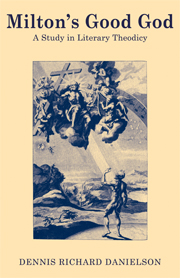Book contents
- Frontmatter
- Contents
- Preface
- 1 The contexts of Milton's theodicy
- 2 God and Chaos
- 3 Assertion and justification: providence and theodicy
- 4 Milton and the Free Will Defense
- 5 Theodicy, free will, and determinism
- 6 Eden and the “soul-making” theodicy
- 7 Paradise Lost and the Unfortunate Fall
- Epilogue
- Appendix: The unfortunate fall of Satan
- Notes
- Selected bibliography
- Index
5 - Theodicy, free will, and determinism
Published online by Cambridge University Press: 04 August 2010
- Frontmatter
- Contents
- Preface
- 1 The contexts of Milton's theodicy
- 2 God and Chaos
- 3 Assertion and justification: providence and theodicy
- 4 Milton and the Free Will Defense
- 5 Theodicy, free will, and determinism
- 6 Eden and the “soul-making” theodicy
- 7 Paradise Lost and the Unfortunate Fall
- Epilogue
- Appendix: The unfortunate fall of Satan
- Notes
- Selected bibliography
- Index
Summary
I have argued that Milton exploits the Free Will Defense as a literary and philosophical model. Now readers as well as writers employ models, consciously or unconsciously, and part of the purpose of this book is to make explicit some of the models Milton uses, in order to keep them from being shouldered aside by someone else's. My assumption in all of this is not that one must accept Milton's models before one can understand his poetry, but that no critical acceptance or rejection of them is possible at all unless one has some appreciation of what they are and mean. In Chapter 31 argued that an orthodox Calvinist model of grace ought not to be allowed to displace the Arminian one that actually operates in Paradise Lost. In the present chapter I shall seek to show what model of free will functions in Milton's theodicy, first contrasting this version of free will with a major but little–recognized deterministic definition of it, secondly concentrating on the peculiar definition given to God's freedom and on its significance for the issue of divine justice, and thirdly turning to Milton's case against the better–known argument that human free will is inconsistent with divine foreknowledge.
- Type
- Chapter
- Information
- Milton's Good GodA Study in Literary Theodicy, pp. 131 - 163Publisher: Cambridge University PressPrint publication year: 1982

